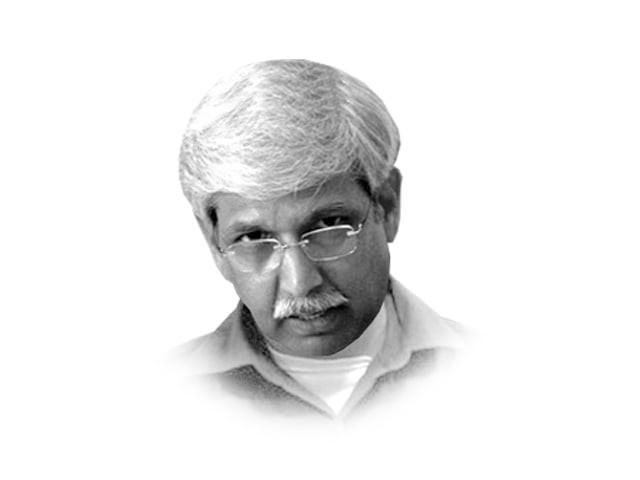What might keep Imran Khan down
Khan's cohorts hold aloft in their hand the traditional whip of corruption to lash all others with.

In his rather laborious struggle to establish himself as a serious proposition in Pakistani politics, Imran has also had the support of some professional politicians — mostly those who either lost favour with the mainstream parties or felt alienated for different reasons. They attached themselves with the platform of Imran Khan just to remain relevant in local dynamics. Not too many in number, some have been seen since Lahore on various television channels spiritedly defending their leader and the party.
The third group keen to associate itself with the Pakistan Tehreek-e-Insaf leader is the ‘roving group’ of politicians; some like-minded, some brazen soloists. It is their ‘roving’ nature though that the Khan may just find expedient to ignore. And that will not bode well for his ‘reformation movement’, especially for his flagship cause against corruption. Perhaps he would do well to first ask himself whether what he is trying to do is a reform movement or if it is a mere fling with electoral power. I guess the fundamental question needing an answer is whether he will seek electoral success on the basis of his reformation movement or seek power to usher in reformation.
There are two examples in recent political history that come to mind which have been predicated on change. In US President Obama’s case, change was sought as an electoral plank that gave him success; but the campaign has fallen flat midstream because of insufficient imagination and a weak political sense; high on ideals but weak on policy formulation and follow-up. The second case when significant change was ushered was under Reagan who first became president on the back of a very weak Carter presidency and subsequently found the way to woo bipartisan support to the concept of a market economy. He was a smooth politician who leveraged his consensus-building skills to challenge orthodoxy. Economic strength gave him the political space at home to challenge dogged security paradigms vis a vis the Soviet Union, which he successfully destroyed by the end of his tenure. Perestroika as a consequence was based on a unique political engagement model that began and blossomed under Reagan.
Our own reformer in recent times was Bhutto who unfortunately had the right ideas but not the commitment to see through the restructuring to its end. He remained divided between traditional politics and ideological flirtation, compromising both in the end amid dwindling political fortunes.
Imran Khan will do well to brush up on the tenures of all three to avoid the pitfalls of a laden political minefield and statecraft.
There are three indicators in the last few days that tell where Imran’s fancy lies. His cohorts have taken on the debate in the aftermath of Lahore with their peers and the language is crass politics — politics in the traditional electoral vein. Rather than present reformative notions in political structures or economic possibilities, they hold aloft in their hand the traditional whip of corruption to lash all others with, occasionally playing to the gallery with popular sentiments against drones, America and India. This is popular politics, not reformative politics. It also smacks of naiveté and an absence of a policy machine in the party. Wannabe politicians and those few who have remained attached from the old fold remain patently closeted in the old argument. The change that Imran Khan promises begins to fade with such unimaginative exposition. His supporters and millions of others who have attached hopes to the success of his movement and wish to see a reimagined Pakistan are likely to be disappointed if course correction is not made, especially when the journey is rather new.
The other indicators are his willingness to accept tried faces in his party. Clearly these are all bounty hunters and are keen to hitch a ride. Then, he has already committed to field a thousand candidates, opening the floodgates for gatecrashers. He may have a compulsion to find electable candidates and Pakistan’s electoral politics can afford only a certain type of a politician, moneyed and hackneyed, if indeed his course is to seek electoral power before bothering with any imaginative reformation. For the moment, the latter is likely to take a back seat, sadly.
Cynical criticism comes easy for us armchair analysts while Imran Khan has traversed long and hard through many a rough territory. What then may we contribute to his journey of hope for the millions? One, he needs to understand and realise that it is such a journey and not a routine political expedition. Two, we would rather that he develop a detailed reformative, national, political and organisational sense before seeking executive office, else he will be as inane as all before, dashing hopes of any rejuvenation. He may thus organise himself on two parallel lines within the party; an electoral plank and a policy plank. It is the policy people that he should interact with more often and hear from after they have worked their thoughts through in an interactive engagement with the core leadership. Largely, I feel it is still time for Imran to hear more than dictate. The same people may then represent the party before the electorate through the media. The electoral side could simply internalise and use policies to woo votes rather than indulge in the old game-playing — even if that means winning elections the next time. For that, his acclaimed killer instinct will need to be tamed some. Politics is just one such beast.
Published in The Express Tribune, November 14th, 2011.

















COMMENTS
Comments are moderated and generally will be posted if they are on-topic and not abusive.
For more information, please see our Comments FAQ